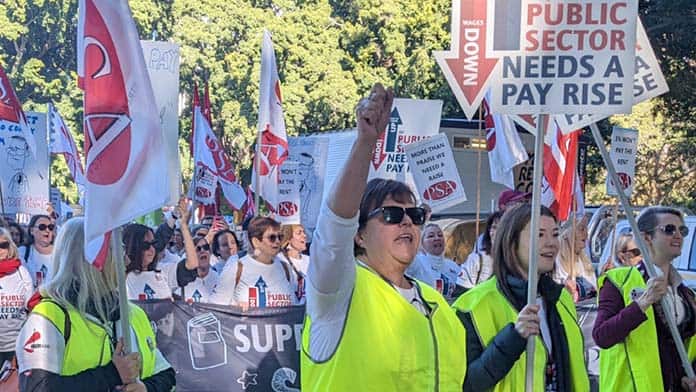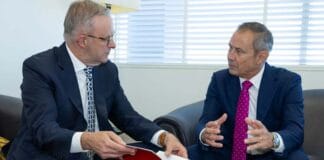Anthony Albanese has spent his first month as Prime Minister emphasising change. He posed for photos with the Nadesalingam family after the new government allowed them to go home to Biloela. He officially submitted new climate targets under the global agreement with the UN. And he celebrated the minimum wage decision that saw a 5.2 per cent increase for the lowest paid workers.
But Labor is still offering far too little change. The Nadeslingam family have not received permanent visas—despite the fact the new Immigration Minister could grant them with the stroke of a pen.
The minimum wage decision comes just as cost-of-living pressures are escalating. Yet Labor has made it clear there will be no further relief from the government. Treasurer Jim Chalmers has said Labor will deliver its election promises but nothing more.
Official estimates are that inflation will hit 7 per cent by December. Gas and power prices are set to surge as profit-hungry power bosses rort the energy market. The Reserve Bank has already hiked interest rates a further 0.5 per cent since the election and Governor Philip Lowe says there are more to come, increasing average home loan payments by up to $1000 a month by the end of next year.
Instead, the new government has begun emphasising the “dire” state of the budget, with Chalmers saying, “There’s not a bottomless pit of Commonwealth cash to solve everything.”
Despite the cost-of-living crisis the poverty-level JobSeeker payments are not being increased and Labor’s boost to childcare funding won’t kick in until July next year.
The money to pay for it is there, but Labor has ruled out even modest efforts to tax the rich, refusing to introduce a windfall tax on the bumper profits gas exporters are raking in from surging gas prices—something even the British Tory Prime Minister Boris Johnson has done.
Under the hopeless Petroleum Resource Rent Tax, 27 gas companies earned $77 billion in revenue between them last year without paying any tax at all.
Strike for a pay rise
Most workers are still seeing their wages go backwards. Those on award wages will get just 4.6 per cent this year—a wage cut after inflation. Public sector workers, including nurses, teachers and transport workers, hailed as heroes of the pandemic, are facing insultingly low wage offers.
The Labor government in Victoria is giving public sector workers just 1.5 per cent. WA’s Labor government is paying 2.75 per cent.
Public sector workers in NSW are fighting the state Liberal government over its wage cap. Premier Dominic Perrottet set the cap at just 3 per cent in his June budget. Public servants in the PSA are the latest to stage a 24-hour strike, after nurses’ and teachers’ strikes earlier this year.
NSW unions are now talking about the possibility of public sector wide strike action. Nurses are set to strike for up to 24 hours on 28 June and state and Catholic school teachers will strike together on 30 June to break Perrottet’s pay cap. This is the kind of action that’s needed. No worker should be getting a pay rise that’s below inflation.
ACTU president Sally McManus admits that enterprise bargaining has failed and has locked in wage cuts. What’s needed is a cross-union industrial campaign to fight for cost of living increases for all.
Climate action
Labor’s efforts on climate also need to go much further. It plans to legislate a target of 43 per cent emissions reduction by 2030 that is lower than the Business Council’s recommendation, the teal independents’ 60 per cent, and the Climate Council’s figure of 75 per cent backed by The Greens.
Instead of working to reduce the use of gas, Labor is backing a dangerous gas expansion that puts fossil fuel profits ahead of climate action.
Resources Minister Madeleine King declared Labor’s “absolute” support for the huge, climate-wrecking Scarborough gas project off WA as well as Santos’ Pilliga project at Narrabri.
The Financial Review has revealed that Labor met mining company bosses before the election to quietly reassure them it “understood” their “importance to the Australian economy”. But the fossil fuel bosses can’t be trusted. The profit-hungry bosses have plunged the power industry into crisis. Labor should nationalise the grid.
The climate movement should not go quiet for Labor. It is going to take a fight to force Labor to end the Liberals’ gas expansion policy.
The election was a clear vote for climate action. More radical action is needed to demand that Labor funds public renewables and to win a just transition for workers in the fossil fuel industry.
The election result showed a hunger for change. But struggle outside of parliament will be needed to win that change. Over the cost of living, wages, climate action or refugees, we will need more strikes and protests. Join us to help build that fight.






